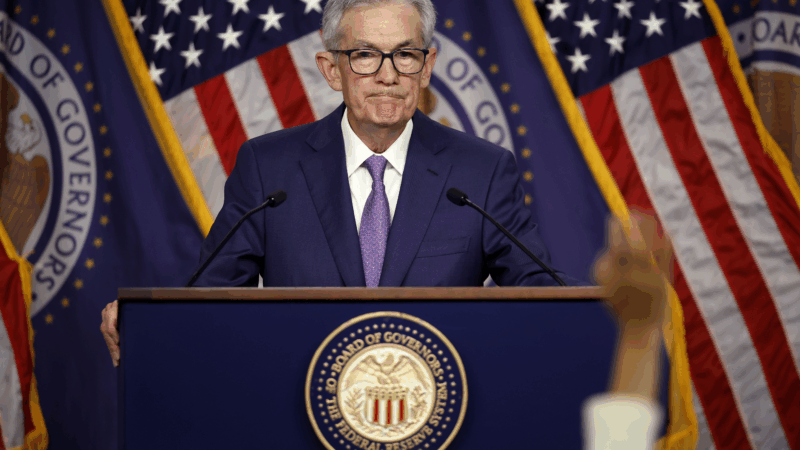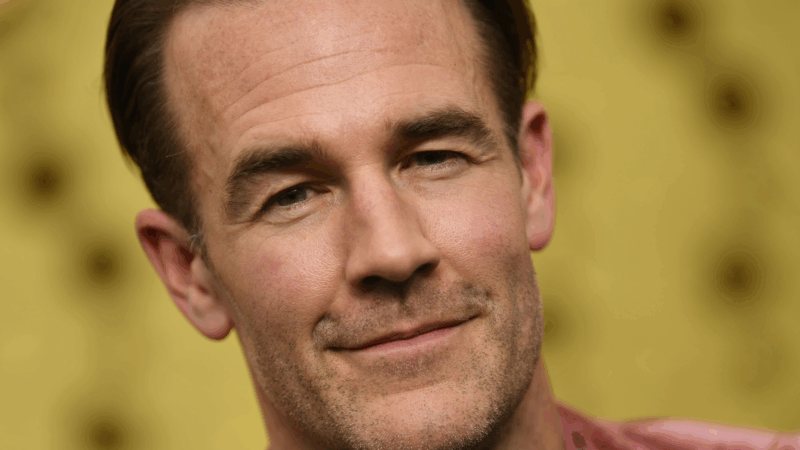A weird partisan pattern of trust in the Fed
Recently, when President Trump threatened to fire Federal Reserve Chairman Jerome Powell, financial markets flipped out. Then Trump insisted he wasn’t going to fire Powell, but he still took time to criticize the Fed’s interest-rate policy under Powell’s leadership. Markets chilled out, a bit.
This confrontation between the president and America’s central bank inspired Planet Money to collaborate with its sister podcast The Indicator to make an episode that serves as a primer on the Federal Reserve. It explains why economists and investors tend to believe that an independent central bank — free of presidential meddling — is crucial to a stable, low-inflation economy. And it goes over a bit of the history of Trump’s antagonistic relationship with the Fed under Powell, a man Trump appointed to head the U.S. central bank in the first place.
As the episode explains, the Fed is supposed to be insulated from partisan politics. But a new study shows how partisan politics has long influenced how much faith Americans have in the Fed. And it’s not as simple as members of one political party trusting the Fed, and members of the other party distrusting it. American faith in the Fed has been more like a pendulum that swings with presidential elections: people have tended to trust the Fed more when their party’s leader sits in the White House. However, this study finds, after this most recent presidential election, the pendulum didn’t swing.
The old pendulum swing
In the study, economists Carola Binder (at University of Texas at Austin), Cody Couture (at Hamilton College), and Abhiprerna Smit (at William & Mary) look at partisan views of the Federal Reserve. They first analyze survey data from Gallup Poll and the Michigan Survey of Consumers between 2001 and 2023.
The economists find a clear pattern in this historical data: a huge predictor of whether respondents said they trusted the Fed was whether their political party controlled the White House.
For instance, if a respondent was a Democrat, they were more likely to express trust in the Federal Reserve when President Obama was in office. If a respondent was a Republican, they were more likely to express trust in the Fed when President Bush was in office (independents, meanwhile, tended to always be the most distrustful of the Fed, whether a Democrat or Republican was in office). This is a factor, the economists find, that is “much larger than any demographic differences.”
It’s kinda weird because the White House doesn’t call the shots at the Fed. The central bank has long been independent of the political branches in its day-to-day decision-making.
Importantly, this phenomenon of Americans expressing trust in the Fed when their political party controlled the White House was true during President Trump’s first term as well (even though, starting around 2019, President Trump began bashing Jerome Powell and the Fed’s interest-rate policies). Republicans tended to have higher trust in the Fed than Democrats, during his first term.
The economists wanted to see if anything has changed in President Trump’s second term. Would this pattern repeat itself? Republicans definitely distrusted the Fed more than Democrats during President’s Biden’s tenure. Would they, like they had in the past, begin trusting the Fed more than Democrats now that a Republican controlled the White House?
This time the pendulum didn’t swing
To answer this question and more, the economists conducted an online survey in early 2025 of more than 3,000 Americans. They did this survey in two waves, shortly before and then shortly after Trump’s inauguration.
The economists’ survey suggests that, actually, this time is different. Republicans expressed lower trust in the Fed than Democrats did (and independents are in the middle, between Democrats and Republicans, in how much they trust the Fed).
The economists offer a couple of potential explanations. One is that the explosion of inflation that began in 2021 “caused a persistent erosion of Fed credibility among Republicans.” Another explanation: Republicans have become “more skeptical of technocracy” – or, Deep-State experts, if you will – “regardless of who controls the Presidency.” Maybe a simpler explanation is that, with Trump publicly bashing Powell and the Fed in the media, his supporters now consider the Fed, under Powell, as being antagonistic to their political tribe.
Binder, Couture, and Smit have another kinda weird finding: Despite Republicans expressing less faith in the Federal Reserve, they were also significantly more likely to believe that inflation will be lower in the future. It’s weird because the Federal Reserve’s biggest job is managing inflation. So many Republican respondents were like, nah, we don’t trust the Fed. But also, inflation is going to go significantly down.
The economists’ survey did offer respondents space to write why they believed what they believed. And — despite the potential inflationary impact of Trump’s tariffs and immigration crackdown — Republican respondents often gave answers that suggested they believed Trump would single-handedly bring down inflation through, for example, business deregulation or greater energy production.
Democrats, meanwhile, expressed the highest faith in the Fed. Yet they were more likely to express fears about inflation. Many of them tended to cite tariffs as a reason why they believed inflation would get worse. Many others just said basically, because, you know, Trump.
Some of these economists’ findings may be a bit puzzling to those who closely watch the Fed. But maybe it becomes less puzzling when you realize: many Americans don’t really understand what the Fed is or what it does! They probably just take their cues from the leader of their political tribe. And, for the first time in decades, the president has been sending a strong signal that the Fed is not doing what he wants.
‘Dawson’s Creek’ star James Van Der Beek has died at 48
Van Der Beek played Dawson Leery on the hit show Dawson's Creek. He announced his colon cancer diagnosis in 2024.
A Jan. 6 rioter pardoned by Trump was convicted of sexually abusing children
A handyman from Florida who received a pardon from President Trump for storming the U.S. Capitol on Jan. 6, 2021, was convicted on state charges of child sex abuse and exposing himself to a child.
A country-pop newcomer’s debut is your reinvention album of 2026
August Ponthier's Everywhere Isn't Texas is as much a fully realized introduction as a complete revival. Its an existential debut that asks: How, exactly, does the artist fit in here?
U.S. unexpectedly adds 130,000 jobs in January after a weak 2025
U.S. employers added 130,000 jobs in January as the unemployment rate dipped to 4.3% from 4.4% in December. Annual revisions show that job growth last year was far weaker than initially reported.
Greetings from Mexico City’s iconic boulevard, where a dog on a bike steals the show
Every week, more than 100,000 people ride bikes, skates and rollerblades past some of the best-known parts of Mexico's capital. And sometimes their dogs join them too.
February may be short on days — but it boasts a long list of new books
The shortest month of the year is packed with highly anticipated new releases, including books from Michael Pollan, Tayari Jones and the late Nobel laureate Mario Vargas Llosa.






